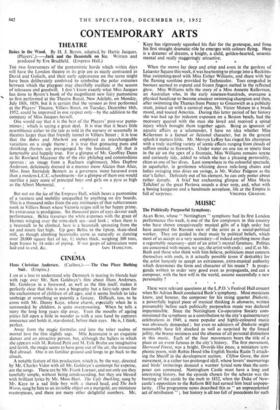CINEMA
Hans Christian Andersen. (Carlton.)—The One Piece Bathing Suit. (Empire.)
I AM at a loss to understand why Denmark is tearing its blonde hair with rage over Mr. Sam Goldwyn's film about Hans Andersen. Mr. Goldwyn in a foreword, as well as the film itself, makes it perfectly clear that this is not a biography but a fairy-tale spun for the enchantment of children of all ages, and it seems foolish to take umbrage at something so patently a fantasy. Difficult, too, to be cross with Mr. Danny Kaye, whose charm, especially when he is surrounded by children, is quite overpowering. When he tells a story the long long years slip away. Even the mouths of ageing critics fall open a little in wonder as with a sure hand he captures innocence and holds it, star-dusted, before their eyes. He is, I think, perfect.
Away from the magic formulas and into the triter realms of mortal love the film slightly sags. Mlle Jeanmaire is an exquisite dancer and an attractive person, but, although the ballets in which she appears with M. Roland Petit and M. Erik Bruhn are imaginative and lavish, the magic seems to have gone out of the air, the innocence fled abroad. One is on familiar ground and longs to go back to the clouds.
A notable feature of this production, which is, by the way, directed by Mr. Charles Vidor with all Mr. Goldwyn's contempt for expense, are the songs. These are by Mr. Frank Loesser, and not only are they tunefully simple, without being condescending, but they are blessed with brilliant lyrics by Mr. Moss Hart. The Ugly Duckling, sung by Mr. Kaye to a sad little boy with a shaved head, and The Inch Worm, sung by him to an invisible object on a marigold, are miniature masterpieces, and there are many other delightful numbers. Mr.
Kaye has rigorously squashed his flair for the grotesque, and from his first straight dramatic role he emerges with colours flying. Here is a dreamer of dreams, a knight, a child, golden-hearted, unsenti- mental and really staggeringly attractive.
i
When the snows lay deep and crisp and even in the gardens of Leicester Square this week, it was heartening to plunge into a Reckitts- blue swimming-pool with. Miss Esther Williams, and share with her the flaming sunshine provided by Technicolor. Toes congealed in bootees seemed to expand and frozen)Ingers melted in the reflected glow. Miss Williams tells the story of a Miss Annette Kellerman, an Australian who, in the early nineteen-hundreds, overcame a physical handicap to become amateur swimming champion and then, after swimming the Thames from Putney to Greenwich as a publicity stunt, joined up with a carnival man, Mr. Victor Mature in a brash, mood, and toured America. During this latter period of her history she was had up. for indecent exposure on a Boston beach, had the necessary quarrel with the man she loved and received a spinal injury which brought them together again. Being as ignorant of aquatic affairs as a salamander, I have no idea whether Miss Kellerman is a factual or fictional character, but in the general splash it matters little. Mr. Mervyn LeRoy has ringed his champion with a truly startling variety of scenic effects ranging from clouds of saffron smoke to fireworks. Under water on one toe or ninety foot in the air on the apex of a fountain, Miss Williams remains serene and curiously tidy, added' to which she has a pleasing personality, clean as one of her dives. Lost somewhere in the colourful spectacle, in aquaballet, in gentlemen whizzing down mile-long chutes and ladies swinging into dives on swings, is Mr. Walter Pidgeon as the star's father. Definitely out of his element, he can only potter about rather damply. A brief but enchanting glimpse of Miss Maria Tallchief as the great Pavlova sounds a drier note, and, what with a boxing kangaroo and a handmade aeroplane, life at the Empire is


































 Previous page
Previous page